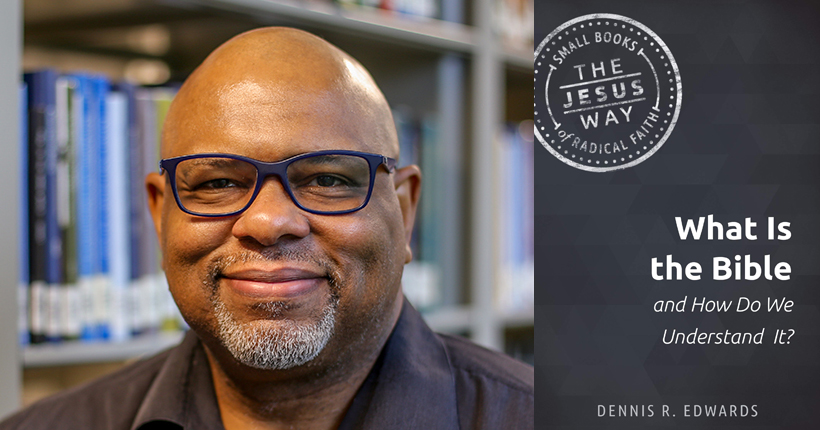About the Author
Dr. Dennis Edwards is no run-of-the-mill evangelical theology and Bible scholar. He’s an utterly unique Christian leader for the contemporary church in the U.S.. Not only is he African American and from New York City, which aren’t typically traits associated with evangelicals in general, much less American evangelical professors—he’s also a highly qualified and experienced pastor and church planter. Having that kind of practical ministry experience inform one’s scholarship is almost as rare amongst evangelical seminary professors as a being a racial minority in a tradition that continues to be predominately white. But Dennis is even more unique than that. Not only is he a consummate pastor-scholar, he’s also an engineer. Before he surrendered to God’s calling on his life to be a pastor and scholar, he received his undergraduate education in chemical engineering at Cornell. How many Bible scholars can say that?!
But what initially drew me to ask Dennis to mentor me back in 2013 wasn’t his engineering background nor his clear academic credentials, it was his unique ecumenism that was a powerful combination to me. See, Dennis grew up attending a Black storefront Pentecostal church in New York. But the first church Dennis planted in Brooklyn was an Evangelical Free church. That’s quite a theological shift! But, that’s not nearly the end of his journey. Dennis went on to plant a second urban, multiethnic church in Washington D.C. with the MCUSA (Mennonites). This is what peaked my curiosity!
When I met Dennis for the first time, it was at the annual pastor’s conference of the Evangelical Covenant Church (ECC) called Midwinter. He was transferring his ordination to that denomination and becoming the Senior Pastor of a flagship multiethnic church in the ECC, Sanctuary Covenant in North Minneapolis, a church planted by Rev. Dr. Efrem Smith. I was struck by the how similar our theological pilgrimages had been (from Pentecostalism to Anabaptism to ecumenical Pietism) when I thought I was all alone. What was the connection between all these historically diverse traditions? The answer is The Jesus Way!
That’s why Dennis Edwards is the perfect author to write an introduction to interpreting the Bible for a series called The Jesus Way for an Anabaptist publisher. He not only has the scholarly credentials, but he has the ministry experience, and the ecumenical vision. That is why I quickly read his new book as soon as I saw it had arrived in the mail.
About the Book
What is the Bible and How Do We Understand It? is one of the first books in a new series called The Jesus Way: Small Books of Radical Faith from Herald Press. These are aimed at everyday disciples of Jesus, not academics. And they are meant to be read together in communities of faith. That’s why they include discussion and reflection questions for each chapter. And they are intentionally concise, so as not to overwhelm those for whom reading about theology is a new endeavor. But this is no small feat for a brilliant scholar like Dennis Edwards. I’m sure, like most preachers, it was more of a challenge to be concise than comprehensive.
This book is so concise, it can be read in a single sitting. However, it manages to touch on many of the most important aspects of what the Bible is and how to read it well. This is power-packed little book that is also winsome and warm in its voice. Dennis manages to share some of his own stories from pastoral ministry and discerning his call to ministry within the pages of this already brief volume, which is nothing short of miraculous. The flow and style reminded me of N. T. Wright’s “For Everyone” series of New Testament commentaries. Wright would often begin his exploration of a passage with some story from his time as Bishop of Durham and Dennis does something similar here, and it works well. It draws you and gets one’s imagination whirling.
There are six main chapters to this book which total 63 pages. They are:
- What is the Purpose of the Bible?
- How was the Bible Born?
- What is the Center of the Bible?
- What is the Spirit of the Bible?
- Who Gets to Interpret the Bible?
- What Impact Does the Bible Make?
Dennis does an excellent job drawing in the voices of important and diverse theologians without overwhelming the book with quotes. The book doesn’t feel too heady. In fact, when Dennis does use technical words, they are bolded, defined in the text, and in a glossary at the end of the book. There are also no footnotes on the page to slow down readers like me (who would want to look up each book cited and add them to my Amazon Wish List!) Dennis’s voice throughout the book is pastoral and conversational, like he was leading a Bible study in his home.
Highlights
The Jesus Way series is obviously primarily geared toward Anabaptist or Anabapt-ish congregations. So it makes perfect sense that this book has some quintessential Anabaptist values such as Christ-centered hermeneutics, Community/Congregational hermeneutics, and a hermeneutic of Obedience. Those are all to be expected. But the parts of this book I loved most were when Dennis challenges readers to resist the formative power of Western culture that can distort our interpretation of the Bible. He did this in at least two ways.
First, he addressed the pervasive and blinding Individualism that is endemic in Western culture. He called upon readers of the Bible to recognize how foreign that ideology is to the authors of Scripture and how easily we Westerners read our Individualism into the Text. Here’s a great example he used to illustrate this point:
Let’s consider Philippians 1:6 as an example. One translation reads: “And I am sure of this, that he who began a good work in you will bring it to completion at the day of Jesus Christ” (ESV). That translation is typical of most English versions. But consider another translation: “I am confident of this, that the one who began a good work among you will bring it to completion by the day of Jesus Christ” (NRSV). Notice how the ESV has “*in* you” and the NRSV has “*among* you,” which captures that the “you” is actually the plural form in Greek.
When most people in the West hear the “in you” translation, they likely hear an individual promise. I certainly heard it that way during most of my years in the church. Philippians 1:6 is typically preached in a way to assure individuals that God will bring them to maturity in the faith. That NRSV translation, however, with “among,” highlights that the “you” is plural in the Greek text. It is quite possible that the apostle Paul’s confidence is related to the communal spiritual progress of the Christians at Philippi. (p.71)
To me, it’s incredibly important that Western Bible readers get this if we are to interpret the Bible well. So I’m very grateful Dennis highlighted the need to resist Individualism.
A second way Dennis called us to resist the formative power of Western culture which distorts our interpretation of the Bible is by pointing out the dynamics of power and privilege on hermeneutics. He did this by calling attention to our “social locations,” which is who we are, and where we are situated in culture and history. He points directly to how social locations have changed our interpretation of passages in the Bible about slavery, for example. The social power and privilege of White Christians distorted their interpretation of Scripture so severely that a book which points to the Liberating Savior was converted into a tool of oppression. I’m so grateful Dennis brings up this example in the book, because this book is likely to be read by many White Evangelicals and/or Anabaptists and they may have never realized how their social locations influence their biblical interpretation. I pray they are more receptive to Dennis making this point than they have been to me.
Not only does Dennis point to social location as an important hermeneutical concept, he also calls upon Bible interpreters to seek the counsel of socially marginalized groups, who have an inherently better understanding of texts written by and for socially marginalized groups.
The Bible was written by and to people who were marginalized. Faithful readers of Scripture recognize that the believing community includes those who have historically been marginalized or ignored. Congregational hermeneutics requires that readers be willing to read as part of groups that are economically, racially, sexually, and otherwise diverse. […]
We who long to get a clearer sense of what is happening in the Bible must receive with humility the perspectives that historically marginalized people bring. The interpretation of Scripture by Christian women, along with believers who are non-white and non-Western, has often been ignored. (p.65, 66)
This is precisely why The Jesus Way series is intentionally written by “a diverse community of internationally renowned pastors, scholars, and practitioners”. The series editors obvious agree with Dennis that Christian, biblical theology cannot be done well by a homogenous group of white, Western men.
Recommendation
Hermeneutics is a passion of mine, one that I’ve cultivated through academic study and local church ministry over the last twenty years. In fact, I’ve felt most at home in my calling as a pastor when I’ve been teaching Jesus-disciples how to read the Bible well. That’s why I’ve spent years teaching hermeneutics in the local church setting. That is why I recognize this book as a fantastic resource for churches. It encompasses so many of the themes I’ve found vitally important to this subject over the years in a concise and accessible package, delivered by an immensely qualified teacher. I whole-heartedly recommend this book, not only to Anabaptist churches, but to all churches. Get it! Read it! Teach it!


